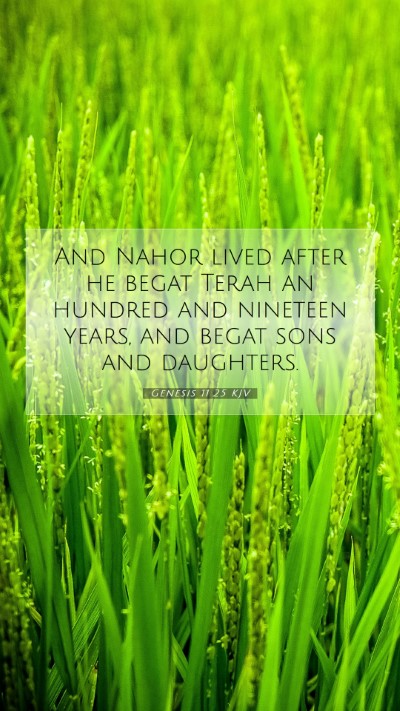Understanding Genesis 11:25 - A Comprehensive Bible Verse Commentary
Genesis 11:25 states, "And Nahor lived nine and twenty years, and begat Terah." This seemingly straightforward verse holds depth and significance that can be unraveled through careful examination and analysis. Below is a summary of the verse's meaning, drawing insights from various public domain commentaries including those by Matthew Henry, Albert Barnes, and Adam Clarke.
Bible Verse Meaning and Interpretations
This verse is part of the genealogy of Shem, tracing the lineage leading to Abram, who would later become known as Abraham, a pivotal figure in the biblical narrative. It provides context to the unfolding biblical history and God's interaction with humanity.
Contextual Background
Understanding the surrounding context is crucial for interpreting this verse properly:
- Genealogical Significance: The genealogies in Genesis are meant to establish a historical framework for the covenantal promises made by God. By listing the ages and lineage, the text emphasizes God's faithfulness across generations.
- Cultural Implications: The age at which Nahor fathered Terah (29 years) aligns with cultural practices of that time, reflecting societal norms surrounding family and procreation.
- Significance of Names: Names in the biblical narrative often carry meanings that reflect personal attributes or divine purposes, which may also be explored through further study of Terah's character and lineage.
Bible Commentary Insights
Insights from public domain commentaries provide a deeper understanding of this verse:
Matthew Henry's Commentary
Matthew Henry notes that this verse highlights the continuity of the human race after the flood and connects to the greater narrative leading to God's covenant with Abraham. He emphasizes the divine providence in sustaining life and the generations that follow.
Albert Barnes' Notes
Albert Barnes emphasizes the significance of Terah in the biblical narrative, indicating that he is the father of Abram (Abraham). Barnes suggests that this genealogical record not only serves as historical documentation but also points to the unfolding plan of God through His chosen people.
Adam Clarke's Commentary
Adam Clarke elaborates on the implications of God's choice in the lineage, discussing how Terah's eventual role and Abraham's calling serve as pivotal moments in transforming human history. Clarke also addresses the importance of obedience in spiritual lineage.
Scriptural Analysis and Biblical Exegesis
Analyzing this verse within the broader scriptural narrative aids in understanding its implications:
- Interconnectedness: Genesis 11:25 connects to several narratives, including the Tower of Babel and God's covenant with Abraham in later chapters.
- Historical Context: This era represented a pivotal transition where humanity was beginning to establish nations and cultures post-flood. The genealogy signifies individual stories woven into the wider story of salvation.
Application of the Verse
When exploring the application of Genesis 11:25, believers can draw lessons about:
- Faithfulness of God: The cornerstone of understanding is recognizing how God maintains His promises through generations.
- Legacy and Responsibility: Every individual plays a role in shaping their legacy; the lives of our ancestors inform our paths.
- Divine Purpose: Reflecting on God’s purpose in genealogy reminds us of the significance of our callings, especially as descendants of faith.
Cross References
This verse can be cross-referenced with:
- Genesis 12:1-3 - The calling of Abraham.
- Genesis 5:32 - The lineage from Shem to Noah.
- Hebrews 11:8-10 - Abraham’s faith and journey.
Conclusion
In conclusion, Genesis 11:25 may appear as a simple genealogical entry, yet it opens the door to rich spiritual insights, historical connections, and a reminder of God’s enduring promises throughout scripture. For those studying the Bible, this verse is an invitation to delve deeper into understanding Scripture, fostering both personal growth and community discussions, whether in Bible study groups or online Bible study platforms.


